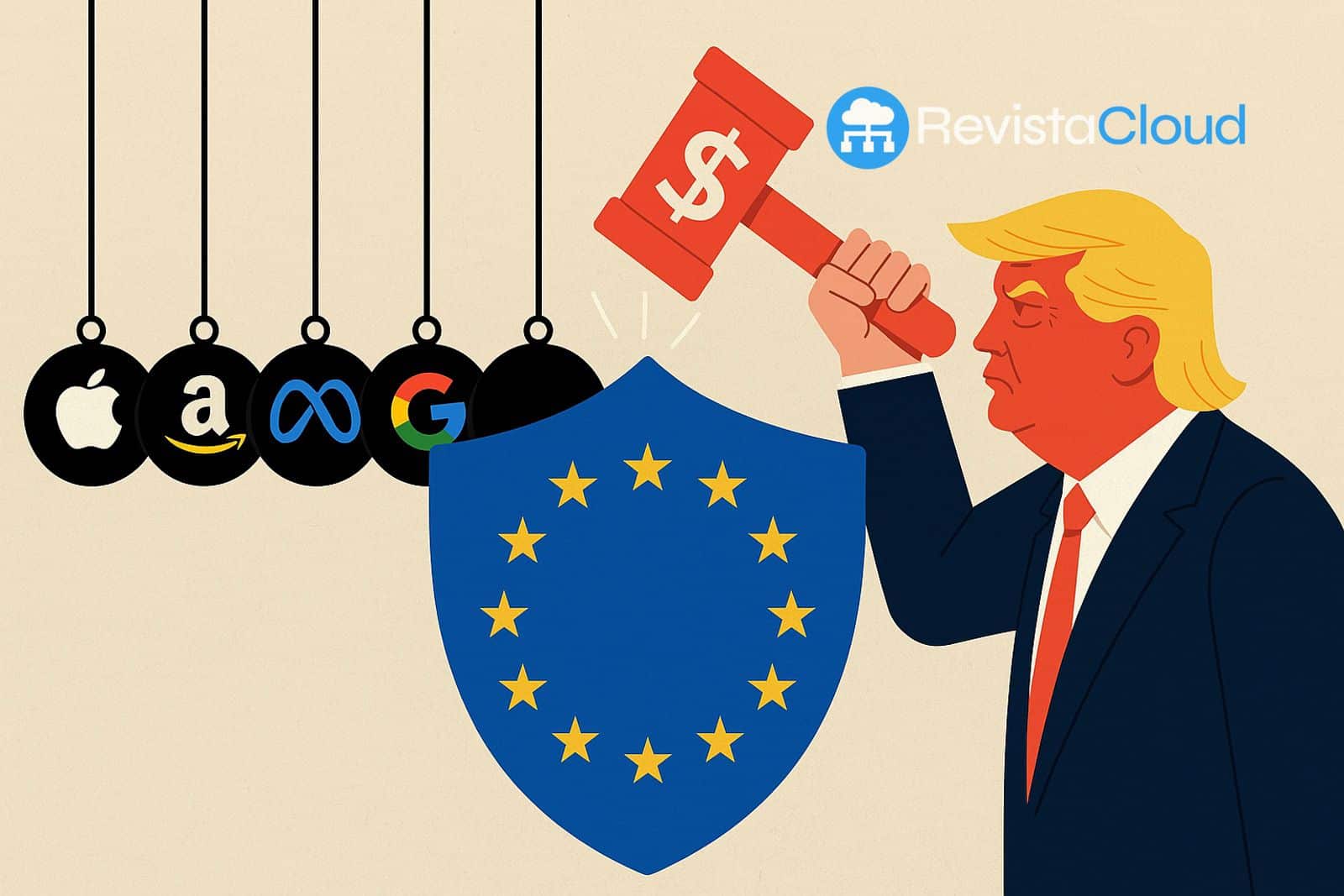The President of the United States, Donald Trump, has reignited the trade war with Europe. Yesterday afternoon, through a message posted on his social media platform Truth Social, the U.S. leader threatened to impose new tariffs on European exports and restrictions on the export of American technology and chips if the European Union does not back down from the Digital Services Tax (DST) and the Digital Services Act (DSA).
Trump was direct in his warning: “The United States is not an ATM or doormat for the world. Anyone discriminating against our tech companies will face consequences.”
[Image: Screenshot]
Europe in the crosshairs
Trump’s accusations claim that these European regulations are “designed to harm or discriminate against American technology” while indirectly benefiting Asian rivals, especially China.
The threat is not minor. If carried out, it would lead to a substantial increase in tariffs on European products entering the U.S. market, impacting sectors such as automotive, agriculture, fashion, and luxury goods, which heavily rely on exports across the Atlantic.
The background: digital taxes and platform regulation
The conflict involves two main players:
– The DSA (Digital Services Act): came into effect in February 2024 and requires major platforms like Google, Meta, Amazon, Apple, or Netflix to be more transparent regarding algorithm use, content moderation, and digital advertising. Non-compliance could result in fines of up to 6% of global turnover.
– The DST (Digital Services Tax): imposes a 3% tax on revenue from digital advertising, data sales, or online intermediating by tech companies with a global turnover over 750 million euros and more than 25 million euros in the country applying the tax.
In Spain, for example, this tax is already passed on to consumers: services like Netflix, Amazon, or Apple have increased prices partly to offset the DST’s cost.
A repeat of the trade war
Trump’s tone echoes the tariff dispute initiated during his first term with China, which left a trail of tensions in the global economy. This time, the focus is on Europe, but it also extends to any other country adopting similar digital taxes.
In February 2025, the White House had already launched an investigation into these levies, labeling them as “discriminatory measures against U.S. companies.” Now, the next step seems to be the formal threat of trade retaliation.
Reactions and potential consequences
So far, Apple has not responded to the statements or inquiries from international agencies like Reuters. An OpenAI spokesperson described these tensions as part of a “pattern of political and economic pressure” that highlights the importance of the battle for control over the digital economy.
In Brussels, the threat is seen as an attempt to influence the European Union’s regulatory sovereignty. Digital law experts recall that both the DSA and the DST aim to achieve a common goal: to curb the excessive power of large tech firms and ensure greater transparency for European citizens.
In the short term, economists warn that increased tariffs would directly impact bilateral trade. Europe annually exports over 400 billion euros worth of goods and services to the U.S., primarily German cars, French luxury products, and industrial machinery.
Beyond trade: a geopolitical debate
The dispute is about more than economics. It also raises a geopolitical debate:
– To what extent can the U.S. condition European digital protection standards?
– Is Europe willing to risk a new trade war to defend its regulations?
– What role will other actors like China, observing these tensions from afar, play?
Frequently Asked Questions (FAQ)
1. What is the Digital Services Tax (DST)?
It is a 3% tax on digital revenues from advertising, data sales, and online intermediary services by large tech companies. It applies to firms with global turnover over 750 million euros and at least 25 million euros in the country imposing it.
2. How does the Digital Services Act (DSA) affect Big Tech?
The DSA requires companies like Google, Apple, Meta, or Amazon to be more transparent about their algorithms, advertising practices, and content moderation. Non-compliance can lead to fines of up to 6% of their global revenue.
3. What impact would Trump’s tariffs have on Europe?
An increase in tariffs would make European products more expensive in the U.S. market, affecting key sectors like automotive, food, luxury, and the tech industry. It could also provoke retaliatory measures from Brussels.
4. How is this different from the U.S.-China trade war?
While the China conflict focused on manufacturing, technology, and intellectual property, the dispute with Europe revolves around digital regulation and fiscal policies for online platforms.

